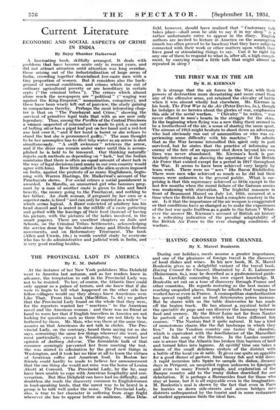At the instance of her New York publishers Miss Delafield
went to America last autumn, and as: her readers knew in advance, the temptation to call in the Provincial Lady was not to be resisted. To her,' of course, the Atlantic liner could only appear as a palace of terrors, and she knew that if she were to begin to tell what happened on the other side her fellow-villagers would say they always knew Americans were Like That. From this book (MacMillan,. 7s. 6d.) we gather that the Provincial Lady found on the whole that they were, for the reporters .wanted her " reactions " to the American novel and the American woman ; and there was no friend at hand to warn her that if English travellers in America are not looking for questions such as those they are not Likely to be bothered by them. Mr. Mais, who was there at the same time, assures us that Americans do not talk -in cliches. The Pro- vincial Lady, on the contrary, heard them saying (or as she says, screaming) the same few-things-wherever she went, and most particularly,' except in Washington, they wanted her opinion of Anthony Adverse. The formidable bulk of that romance seemingly prevented her from meeting the test. She was stirred to admiration by the great new things in Washington, and it took her no time at all to learn the virtues' of American coffee and American food. In Boston her friends could hardly be made to believe her announcement that the one thing she would not miss was the home of Louisa Alcott at Concord. The Provincial Lady, by the by, may have been unable to cope with American hospitality and con- versation. But Miss Delafieldcan have had no dirffty, and doubtless she made the discovery common to Englishwomen in loud-speaking lands, that the surest way to be head in a group is to talk well under the noise. The Provincial Lady, also, is true to her character in suffering from stage fright whenever she has to appear before an -audience._ Miss Dela.
field, however, should have realized that " Customary talk takes place—shall soon be able to say it in my sleep " is a rather unfortunate entry to appear in the diary. English authors are invited to lecture in America on the assumption (much too often proved to be baseless) that they have subjects connected with their work or other matters upon which they have good or stimulating things to say. Can it be right for any one of them to respond to what is, after all, a high compli- ment, by carrying round a little talk that might almost be repeated in sleep ?










































 Previous page
Previous page